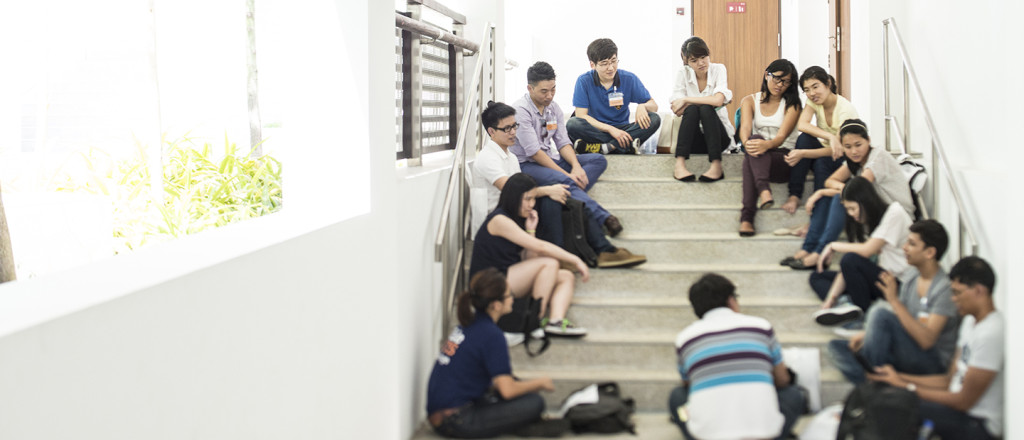Team-based learning is introduced in Quantitative Reasoning classes at Yale-NUS

What is the key to transforming a bored and inattentive class of students to an involved and informed audience? Professor Jon Berrick, one of the instructors of the Quantitative Reasoning course for Yale-NUS students in Semester Two, believes that Team-Based Learning (TBL) is the answer.
“Ever since we started, it’s clear that students are enjoying the course and the instructors are pleased with the results,” declared the Mathematics Professor.
The key, essentially, is having the students undertake the knowledge acquisition part of their learning before the class. They are tested individually on this preparatory material upon arrival in class. They then work in teams of about six, first to repeat the test, and next to participate in class activities that explore the concepts and issues in more depth. The teams are fixed throughout the semester, and are allocated so as to balance students’ talents, backgrounds and aspirations. This is especially important for a heterogeneous class of Common Curriculum students at Yale-NUS.
With the responsibility for acquiring knowledge shifted to students before the class, class time is freed to concentrate on deeper, more active learning goals, such as understanding, applying, analysing, evaluating, and even creating. Students benefit from the informality of intense discussion with their peers, to whom they are often more receptive, especially as compared with the unidirectional lecture format. Students also develop skills of teamwork and communication.
Student Erika Terrones Shibuya (Class of 2017) finds it makes the learning easier. “I learn more from my classmates in my group than from the readings because I feel like our classmates can explain concepts in simpler terms since we are of similar age group. Also, some of students may not be comfortable raising a question in front of the whole class and rather do so in a group setting instead. I also gain other perspectives of the same readings or questions through group discussions we do together which is enriching to my learning.”
TBL started in the late 1970s as an attempt by Larry Michaelsen, a Management Professor at the University of Oklahoma, to deliver to students in large classes the same intensity of experience that they enjoyed in small classes. With successful results, usage became more widespread, and in Singapore, the TBL model has already been successfully used by schools such as Duke-NUS and NTU. Introduced to the inaugural batch of Yale-NUS students in the Quantitative Reasoning class, students meet in groups twice weekly for three and a half hours. Each of the four sessions in a day comprises six to seven teams, each with just six or seven students. Most assessment occurs in class, although there are occasional written assignments and peer evaluation (of contribution to the team effort). The semester will culminate with a team presentation related to a survey project being conducted by all students and there won’t be a final examination.
“It’s an interesting method of learning where we benefit most if we prepare well before class, and hear theories explained by classmates – it’s a lot easier to understand it coming from them sometimes. I definitely enjoyed the process,” shared student Kevin Low (Class of 2017).
Dr Christopher Asplund, one of eight instructors for the course, was impressed with the students’ performances. He said, “They are doing well, which I think is mostly a testament to their abilities, willingness to try something new, and tolerance for uncertainty.” Dr Asplund shared that he was more behind-the-scenes last semester, as he developed content and delivered lectures but did not lead seminars.
He added: “I’ve been impressed by how engaged the students are with the pedagogy, viewing themselves as partners in making the course successful – as they should. Feedback, delivered in person or anonymously through IVLE, has been consistently helpful. Students are happy to share what’s working, what isn’t, and what alternatives we might consider.”





